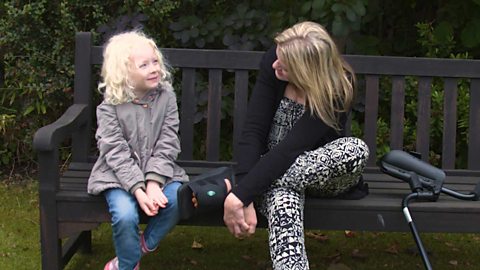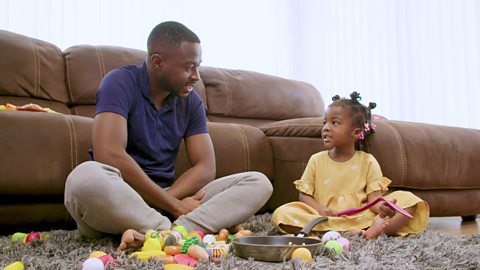Child psychologist Linda Blair writes all about imaginary friends, why some children have them and what to do if you're worried about them.
Have you ever settled on the sofa next to your child, only to be told that you need to move over to make room for Super Tom who will be flying in through the window to join you soon?
Or have you ever found sweet wrappers on the kitchen floor, and when you called your child to pick them up they told you it was Naughty Teddy who dropped them?
This article is all about imaginary friends. I’ll explain why some children have them and when they’re most likely to do so, and what purposes they serve for children. I’ll also suggest helpful ways to react to this new member of the family, and what you can do if you’re worried they seem to be having too much influence over the household.

What are imaginary friends?
Imaginary friends are characters a child invents, which they treat as if they’re real and present.
Most often they’re based on real people the child knows or has heard of, but they can also be modelled on fictional characters such as a superheroes or favourite cartoon characters. Sometimes they take the form of a fairy or animal. They can be invisible, or sometimes a child’s blanket or favourite stuffed toy can become an imaginary friend. They’re most often seen as a protector, role model or companion, although occasionally they’re thoroughly naughty and disruptive, doing whatever the child’s parents consider to be bad behaviour.
When do imaginary friends appear? Do all children have imaginary friends?
Imaginary friends are most often reported by children aged three to six, and most of them disappear by around age eight. However, they may remain part of a child’s life for a considerable time - it’s not unusual for a 12 year-old to report their imaginary friend is still around.
Imaginary characters are reported more often by girls, but the difference across genders is small. And one study found that first-borns and only children are most likely to have an imaginary friend. In any case, imaginary friends are a normal feature of childhood. Research suggests about 45 - 65% of children will enjoy their company at some point.

Are imaginary friends good or bad?
It was once thought an imaginary friend was a sign the child may have or would have mental health problems. However, there’s no convincing evidence for this. Children who have imaginary friends are usually sociable, imaginative, interested in other people, and good at seeing life from other points of view. Although many children without them also show those qualities.
It will no doubt come as a relief if your child has one to know that children with imaginary friends tend to have about the same number of ‘real’ friends as those without. This is reassuring, because it means that if your child invents a friend, it’s almost certainly not because they’re feeling lonely.
Nor are there any noticeable differences between the two groups in terms of intelligence or personality.
It's almost never a bad sign if your child has an imaginary friend, and in many cases it’s a good thing.
How can having an imaginary friend help my child?
The easiest way to think of your child’s imaginary friend is that it offers them training in working out the best way to sort out differences, improve their relationships, and find ways to overcome new challenges.
Here are some examples:
Suppose you’ve just had a baby and your toddler can’t understand why they’ve lost so much of your attention. Inventing an imaginary friend could provide a stand-in playmate while their sibling is too young or help them to understand how the baby may need attention.
Perhaps great-granny has died. Talking to their imaginary friend about how much they miss her can ease your child’s pain, especially if they comfort them.
Should I ever worry about my child’s imaginary friend? If so, what can I do?
It’s usually best to play along with your child. Your child knows their friend is imaginary, but at the same time they’ll love it if you keep up the pretence. However, there may be some circumstances to look out for.
First, and by far the rarest, is when your child insists their imaginary friend is real and refuses to ever be parted from them, even if the friend frightens them. If this is the case, it may be best to talk to your doctor or health visitor. This really is incredibly rare, and if it’s a problem you would also likely notice other signs for concern, such as withdrawal from social situations and a loss of interest in their favourite activities.

Much more common are the following three situations.
If the imaginary friend’s demands become excessive and inappropriate, you may want to draw the line, just as you would if they weren’t involved. You should never feel you have to stand up while Super Tom sprawls in your space or allow your child to insist that Naughty Teddy leaves their real-life sibling without a seat at the dinner table.
Secondly, look out for if your child blames their imaginary friend for things they themselves did wrong. Even though they insist Naughty Teddy dropped the biscuit wrappers on the floor, because he’s their imaginary friend, your child is still responsible for their behaviour.
Finally, if your child seems otherwise their normal self, but is anxious about a specific situation, say going to nursery, and tries to avoid it by insisting they stay with their imaginary instead, you may need to check out what’s going on beneath this behaviour. Talk to the key person at their nursery so you can work together to remedy the situation.
Although there can be occasions where imaginary friends present a problem, most of the time they’re a great way for your child to exercise their imagination and explore different ways of behaving socially.






